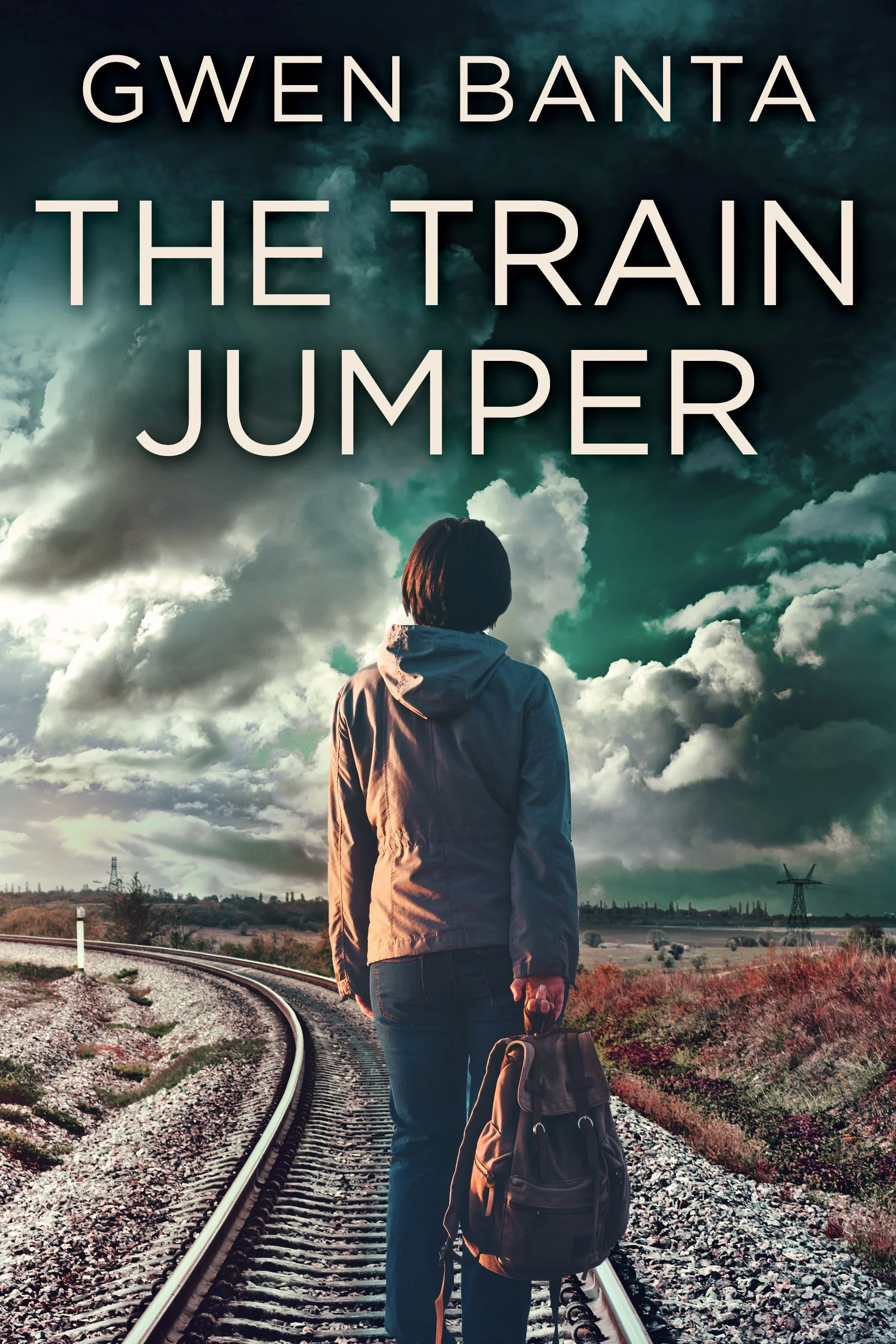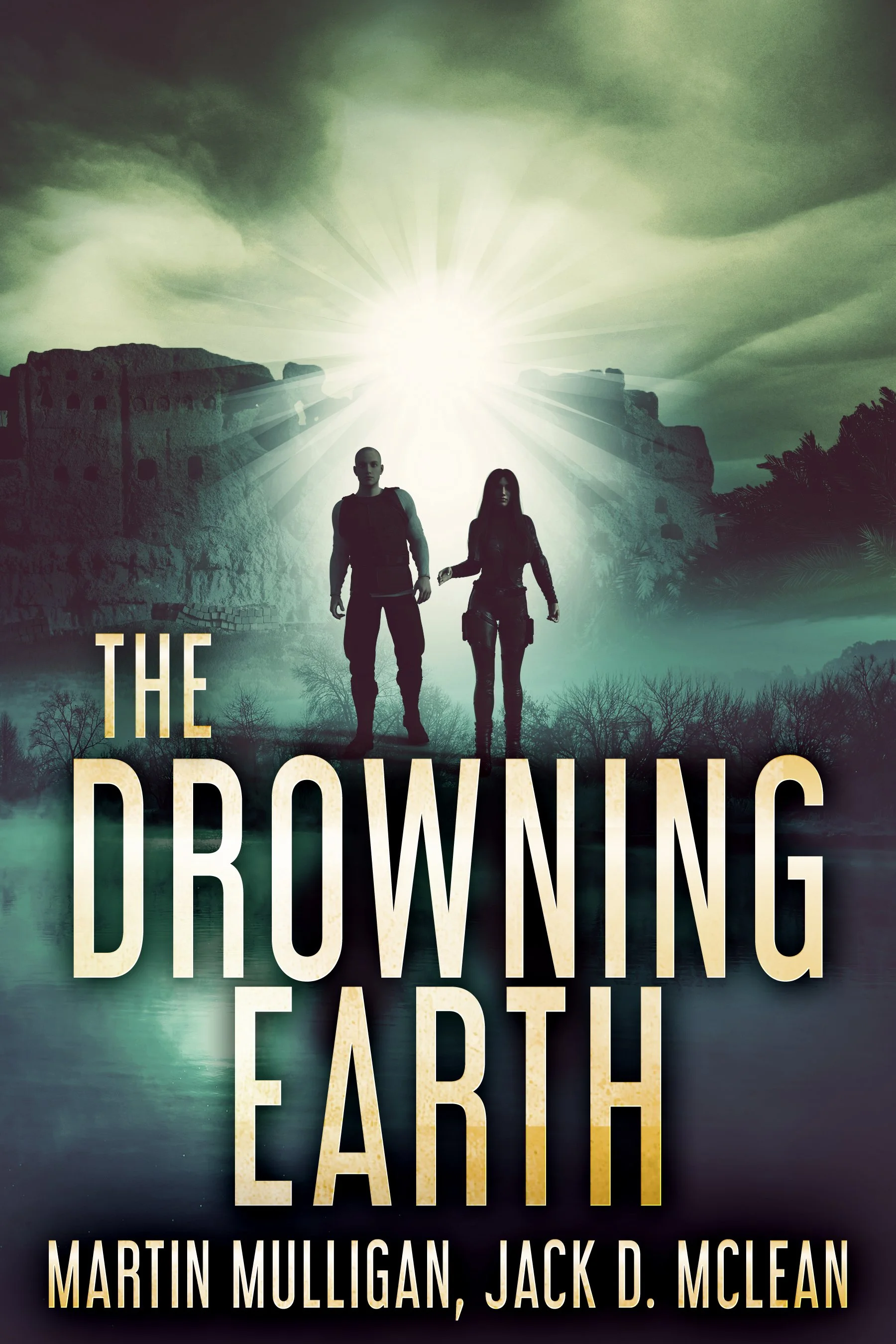The Train Jumper - Gwen Banta
A Train-Hopping Adventure Novel Set In 1950s America
The Train Jumper by Gwen Banta
Book excerpt
By the time I stopped running through the field, I had reached the hobo encampment. I dropped down beside a small group of travelers and stared ahead at the tracks. A few of them noticed I was crying and shaking, but no one interfered. They nodded and continued talking as though my presence was nothing unusual. In their lives, I suppose it wasn't.
I thought I was just catching my breath, but I stayed for weeks. The field comforted me. Jake and I had spent many nights sleeping in his back yard under the stars, so the outdoors was more of a home to me than almost anywhere. The open air gave me the freedom to stay or to run, but I had nowhere else to go. I couldn’t go back to Jake’s house, and I couldn’t go home.
The encampment itself was as familiar to me as any other place in town, and the itinerant workers who passed through town had never frightened me. Many times, Jake and I had sat with the campers around their campfires, so I was somewhat familiar to them as well.
School had ended, so I had no place to be, and nowhere else I wanted to go. I needed time to organize my thoughts before confronting my father, who had lied to me about my mother’s death. During that time, I ate and slept with the hobos near the tracks. I was too jumbled up inside to worry about safety or comfort.
It took time for the itinerant workers to accept me. At first I was not trusted, as I was more of a curiosity, but eventually I was just another fixture in their outdoor community.
I often washed in the creek like they did, and I accepted their handouts. Old Pete and his buddies would bring back buckets of water pilfered from hose bibs at the houses along the tracks. Others would contribute hot dogs purchased with the change they had managed to panhandle. They would cook them over the open fire and insist I eat something. I did, but it was purely mechanical.
I wandered home from time to time to get clean clothes or to take a hot shower, and I would bring back whatever sandwich fixings I could find. I was too adrift to sleep in my bed, and I did not want to see my father. I knew the Jacksons had been by my house to look for me, because there was fresh soup in the refrigerator, which I left there for my dad. The house was more of a mess than usual, with butts in every ashtray and empty bottles lined up on the porch. I grabbed an unfinished bottle of whiskey to take back to the camp with me.
Although I was underage, I started drinking at night by the campfire. I welcomed the numbness. The experience helped me to understand the reasons my dad hid his emotions in a bottle. He had every right to try to stifle the pain. But he had no right to lie to me about my mother or to take away the one thing I believed would have made me whole - maybe I could have met my mother.
Every day, different train jumpers came and went from Wabash, leaping on and off the trains as though our little encampment was a depot. Some newcomers were surprised to see me, while others were indifferent, but most were respectful. I sensed an unspoken bond among the train riders - we were "us," while others were "them." We all shared something in common - the open air and lack of roots allowed for freedom from whatever each of us needed to leave behind.
There was a core group who frequented Wabash as their base. Many of them had led interesting lives before becoming homeless. Leland went to dental school before going to war, but after witnessing so much brutality, he could never reestablish his life in Scranton.
Leland once told me, "I just feel more comfortable with my rail mates. After the war, I tried to go back home, but I couldn’t fit in. I even did a bit in jail for lifting food. One day I just hopped a train and took off. I doubt if anybody ever noticed I was missing. I’ve covered the rails for nigh some twenty years, but I like it here in these parts best. It’s familiar.”
“So you don’t miss your old life at all?”
“Well, come to think about it, I sure miss my piano. I could play a mean honky-tonk melody or two.” Doc moved his fingers as if playing a keyboard.
“I sure wish I could have heard you play.” Leland fascinated me. He carried himself like an old country gentleman. His white hair and straight posture gave him an air of dignity. “Why do the others call you, ‘Doc’?” I inquired.
¬¬“I had a little education, so these fellas treat me special. It may not be much, but every man has to have a bit of self-respect. This here is a good group of reg’lars. We get the occasional felon, but most are itinerant workers ridin’ the rails looking for work. Wabash is a mighty good place to stay. The local cops and the railroad bulls who patrol the rails don't try to run us outta here like they do in other towns.”
There were tales of great tragedy as well. Mary, a wiry and silent camper, had lost her husband and baby in a car accident according to Doc. Mary was now traveling the rails looking for seamstress work. I tried to talk to her, but she always politely indicated her preference to sit by herself. I could see she was terribly sad, so I didn’t press her.
Sometimes I shared some food with Mary, and I was happy to accept one of her tea bags in return. One day I brought back a thimble I had found while walking in the field after dropping by to check on my dad. I saved it for her because it was the only pink thimble I had ever seen.
“It’s a good’un,” she nodded when I gave it to her, shooting me a rare smile.
The person I spent the most time with was young Joe, who had lost an arm in a combine accident. He couldn't find steady employment, and he couldn't deal with the way people reacted to him. His body seemed off-balance, but it didn’t bother me at all. I think he appreciated my acceptance of his appearance, because he began to take an interest in me and to guide me to make sure I could take care of myself.
Charles was the saddest of all. His face was grossly disfigured as a result of devastating injuries from the Korean War. He was almost unbearable to look at, and he knew it. He had a mask he sometimes wore, but often he yanked it off in irritation and rubbed the mangled tissue that tentatively clung to the framework of his face. Sometimes I heard him moan during the night, which was sad and unsettling.
It was hard for Charles to talk, so he didn’t say much, and he always sat by himself when he needed to eat. Once I saw Doc chopping carrots and green beans he had pilfered from a nearby farm. He minced them very fine, using his pen knife and the lid of a coffee can for a cutting surface. When he handed the mixture to Charles, I turned away and pretended not to notice.
On the few occasions when a new drifter joined our camp, Doc made sure no one commented about Charles’s appearance. “He’s a fine soldier and a good man,” Doc pronounced.
The “Boxcar Willies,” as they called themselves, seemed to have a language of their own, which I picked up quickly. Their encampment was its own society, and no one asked many questions about my circumstances. My solitude was simply accepted.
I was at the camp for more than a month before Jake and Mr. Jackson spotted me one morning as I was returning from my house. Several times I had seen them driving slowly along the streets bordering the field, the bright yellow of Marilyn’s paint standing out in contrast to the gray of my world. I knew they were looking for me, but I was not ready to confront them.
The day Jake finally saw me, he called out my name, but I headed straight back to the encampment. After that, Jake and Mr. Jackson came by fairly regularly to check up on me, but they kept their distance. Jake's limp was still bad, so I always noticed him coming across the field. Even though I was not ready to have any sort of conversation with Jake and Mr. Jackson, they always inquired of my welfare and left food and books for me with Pete and Doc.
Often Jake’s packages included a note. Usually, his messages were full of remorse, but sometimes they were intended to cheer me. Once he included an amusing, hand-crafted necklace made of Cheerios and cotton balls with a crudely drawn price tag of $60. Another package contained a drawing of him swinging from a noose wearing only a Viking hat, which made me laugh out loud.
I missed Jake, but I needed time to find my direction. I knew it wouldn't be long before Mr. and Mrs. Jackson would call the authorities, but for the time being, they were giving me the space I needed to survive.
Every day I watched the trains go by, but I didn't have the motivation to throw bottles without Jake. During those nomadic days, Joe and I passed the time jumping on and off trains. Although Joe only had one arm, that arm was remarkably strong, so he could swing up with ease. He always went first, and I would board several cars behind. We liked to ride a short distance before hopping off as our unwitting iron and steel hostess slowed down to enter a bend. The thrill of the danger was the only emotion I wanted to feel. It was the only thing that made me feel alive.
Joe knew the route well. He taught me to get as close to the depots as possible for boarding and dismounting so the reduced train speeds would work in my favor. Once in a while, our timing would be off and a station master or a passenger waiting on the platform would spot us. There was nothing much they could do but shake their heads and continue with their business.
Joe took pride in being my mentor. “You never want to deck a car. It's crazy to try to climb to the top, and a fast train will throw you off her. You could lose your life that way, girl.”
“Got it,” I reassured him.
“And don't ride the blinds at the front of the baggage cars. Standin’ on the couplers is real dicey - if there’s a sharp jolt, you can easily fall between the cars. Just stick to what you know. You're good at hoisting yourself up, but don’t go doing nothin’ tricky.”
I followed Joe’s instructions carefully. I had a few narrow misses, but I became quite expert at hopping. Joe also taught me how to hit the ground properly - to lean forward and start rolling upon impact so the pressure of landing would not be centered in my feet. My ankle still hurt at times, so I tried to follow his technique precisely. At the end of each day, my muscles were always very sore. The adrenaline rush distracted me from my situation, and as foolish as it was, the constant danger helped me to ignore the anger brewing inside me.
Sometimes, I caught a glimpse of Jake standing quite a distance down the rails. Even in the distance, I noticed his posture bent under the weight of defeat. A burden too heavy to carry had been forced upon him, which I knew was unfair to him too. Had it been at my father's direction that the Jacksons never told me? Had it been Mr. Jackson's decision?
During my weeks at the encampment, I pieced together the life-long hints and clues to a puzzle I had not even known existed. All the years of furtive glances and conversations that abruptly fell to silence when I entered a room started to make sense.
In my mind, I replayed scenes I had dismissed at the time, assuming the disapproving glances had something to do with my dad. Other times I concluded that the odd looks were a result of my wardrobe - masculine leftovers from Jake until I grew taller than he was, or old work clothes from my father after I sprouted up to his height.
Who else knew the truth? Did neighbors take pity? I remembered the day Norma Schroeder brought some dresses to school in a brown grocery bag, a gift from her and her family. Unfortunately, they were much too small because I had started developing breasts at an early age, but I kept the bag at the bottom of my closet like hidden treasure.
Book Details
AUTHOR NAME: Gwen Banta
BOOK TITLE: The Train Jumper
GENRE: Action & Adventure
SUBGENRE: Coming Of Age
PAGE COUNT: 158















Praesent id libero id metus varius consectetur ac eget diam. Nulla felis nunc, consequat laoreet lacus id.